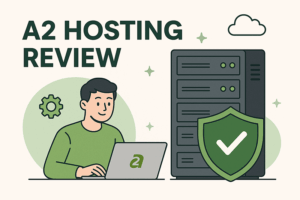Why Web Hosts and Developers Should Avoid Bluehost: Hidden Costs, Poor Service, and Better Hosting Alternatives [2025]
Once a top pick for web hosts, Bluehost has taken a sharp turn for the worse in recent years. After its change in ownership, aggressive ad campaigns and deceptive upsell tactics have become the norm. Service reliability has slipped, with long outages, poor customer support, and hidden fees clouding the value promised in their web hosting plans. We used to recommend Bluehost without hesitation, but the steady stream of negative client experiences has forced us to warn our clients and readers to avoid it altogether.
Web developers and site owners now report major issues, from unresponsive support to unexpected price hikes and lack of transparency. The shift began with Bluehost’s acquisition by a larger company, and since then, its clear profit has taken priority over quality and honesty. Our team no longer accepts new projects hosted on Bluehost, and we advise anyone serious about reliable web hosting to seek better alternatives. You deserve a host that backs up its promises and treats your business with respect. While we still have clients at Bluehost who are grandfathered in, we are not accepting any clients hosting with this company.
The Rise and Fall of Bluehost’s Reputation
For years, Bluehost stood tall among web hosts, building a name trusted by developers, agencies, and site owners everywhere. It was cited as a safe, reliable choice for hosting a new project or scaling a growing online business. However, everything changed after the company was acquired. Since then, Bluehost’s standing has collapsed, and its practices have caused a rift with longtime partners and customers.
A Trusted Web Host: Until the Buyout
 Photo by panumas nikhomkhai
Photo by panumas nikhomkhai
Bluehost built its reputation by delivering strong performance and clear terms at competitive prices. In the early 2000s, developers and web professionals viewed Bluehost as a top destination for reliable web hosting. Features such as user-friendly dashboards, one-click installs, and responsive support made it easy to recommend for small businesses, bloggers, and larger clients alike.
Many in the web hosting community pointed clients to Bluehost with confidence. The brand stood for fair pricing, dependable uptime, and honest customer care. Developers could launch new websites without second-guessing their hosting choice; Bluehost was seen as solid and reputable.
But that certainty was short-lived.
Transformation After Acquisition
After its acquisition, Bluehost’s management and strategy changed almost overnight. Quality plummeted, and hidden fees appeared in what had always been straightforward plans. Suddenly, billing became confusing, with recurring payment issues leaving customers frustrated.
Customer stories started to flood in:
- Support became less responsive, with clients left waiting days for help.
- Longtime customers faced unexpected and unjustified price hikes.
- Dishonest upsell tactics appeared during the checkout process and even after purchase.
- Refunds promised for flawed services were often delayed or never delivered, as seen in first-hand accounts such as “Bluehost charged me $8,707, promised a refund, then refused”.
Even reputable review sites now report a cascade of negative feedback. For example, Reviews.io showcases long-term clients citing degraded services and broken trust. The overall tenor shifted swiftly from “highly recommended” to “use at your own risk.”
For those who care about transparent, honest service, Bluehost’s decline is a cautionary tale. A host once hailed for reliability became an example of what can go wrong when a company is run for profit over quality. As a result, responsible web hosts and developers now warn clients to consider better web hosting alternatives.
Aggressive Advertising and Bait-and-Switch Tactics
Bluehost once gained customers by offering what seemed like unbeatable deals on web hosting packages. But the story changes fast after the sign-up. Aggressive advertising campaigns promise web hosting at rock-bottom rates, but most discover these rates are a temporary illusion. The real costs, hidden upgrades, and tricky upsells come later, often when moving away is difficult or costly. It is this pattern of enticing low prices, vague terms, and constant upselling that has led many developers and users to walk away from Bluehost altogether.
Introductory Pricing Versus Long-Term Costs
New customers get lured in by heavily discounted intro rates for hosting plans. At first glance, Bluehost undercuts most competing web hosts. But when that first term ends, costs jump dramatically, often without warning.
- The price you see advertised is usually for a multi-year commitment. Paying month-to-month or even for a single year means missing out on the “deal.”
- When renewal arrives, standard rates can be more than double the introductory offer.
- Extras like SSL certificates, privacy protection, and domain registration quietly tack on significant fees.
For example, a basic shared hosting plan might start at just a few dollars a month, but after the intro period, renewal prices soar, and services that were free now cost extra. According to this analysis of Bluehost’s pricing, some plans triple in cost after renewal, and essential features like domain protection and backup are often excluded from intro rates. Users often face a bill far above what they planned for.
Hidden costs also include:
- Domain renewal: The $1 first-year domain skyrockets to $15+ per year.
- Privacy upsells: Identity protection is not free after the first year.
- Add-ons: Basic site backups, malware scanning, and even simple SSL can be unexpectedly expensive.
You can find a clear breakdown of Bluehost’s recurring hosting fees on their official help page, showing how small add-ons quickly inflate the total cost and trap users in a cycle of hidden expenses.
Opaque Terms and Upselling Practices
Aggressive marketing doesn’t stop at pricing. The moment you start checkout, Bluehost begins pushing a slew of add-ons; most not needed for simple sites. Confusing terminology and bundles mask the real value of what you’re buying.
 Photo by Eva Bronzini
Photo by Eva Bronzini
The upsell tactics include:
- Bundling unnecessary tools into basic plans makes checkout stressful and messy.
- Adding premium services (like site backups or security tools) by default, which must be manually removed to avoid being billed.
- Unclear descriptions for what’s included and what’s optional, so users end up paying for features they may never use.
- Locking users into the Bluehost ecosystem; moving your site out is harder and more expensive than it should be.
What begins as a $2.95 per month plan may balloon into $10, $15, or more each month. Many real-world complaints echo the bait-and-switch scams documented by site owners and shared in communities such as this active Reddit thread where people explain how unlimited plans get restrictions and unexpected limits.
Once inside the Bluehost system, escaping steep costs proves frustrating. The hosting provider often bundles essential technical functions behind paid gates, discourages migration, and makes closing accounts or retrieving site backups needlessly complicated. These tactics target less technical users and busy professionals alike, maximizing profit at the expense of customer trust.
For web hosts, developers, and site owners prioritizing honest, clear service, this is a major red flag; evidence of a provider relying more on slick marketing and complex terms than quality service.
Customer Service and Support Failures
Prompt and knowledgeable support is a must-have feature for any dependable web host. When clients face downtime, billing problems, or critical errors, they need real answers right away, especially if their website is key to their business. Instead, countless Bluehost customers now report a disappointing pattern of delayed responses and scripted support that fails to solve real problems.
Delayed Responses and Scripted Help
 Photo by Jep Gambardella
Photo by Jep Gambardella
Today’s web hosts must respond fast when something breaks, but Bluehost falls short, often leaving customers in limbo. Stories abound of hours-long, even days-long, delays before receiving anything beyond a generic acknowledgment. When the replies finally arrive, many clients are handed a scripted message that does not address their unique situation.
This approach breeds frustration and frequently feels like talking to a chatbot, not a real person. Here’s what users often experience:
- Long wait times: Customers find their urgent support tickets stuck in a queue, sometimes for more than a day.
- Copy-paste replies: Many report receiving nearly identical responses, regardless of their specific issues.
- No follow-through: Follow-up questions lead to another round of the same rote replies.
Such inconsistent support isn’t just an annoyance; it can directly harm your business. If you’re a web developer or agency waiting on help to restore a client’s website, time is money. Being stuck in an endless support loop leaves projects stalled and reputations at risk.
Countless online accounts, including the popular Reddit support complaint thread, echo this same sentiment: Bluehost’s once-reliable support is now viewed as a hurdle, not a help. Even information on Bluehost’s contact page sometimes leads users into circles, with promised 24/7 support often drifting into the reality of waiting and frustration.
For anyone serious about web hosting and client care, a provider’s inability to deliver helpful, timely support is a dealbreaker. Modern site owners expect better; and they deserve it.
Technical and Ethical Concerns With Bluehost Web Hosting
Web hosts should deliver speed, stability, and trust above all else. But with Bluehost, mounting technical problems and questionable billing practices have pushed many developers and small business owners to cut ties for good. Let’s look at the big issues that show why Bluehost is no longer a safe bet for web hosting clients who value honest, dependable service.
Performance Problems and Downtime: How Bluehost Fails Its Users
Fast, stable hosting is the backbone of a good website. Unfortunately, repeated reports show Bluehost often falls short. Despite bold marketing about “blazing fast” servers and ultra-reliable uptime, many users experience:
- Slow load times: Pages crawl instead of snapping open, especially during peak traffic. This frustrates visitors and hurts search rankings.
- Recurring outages: Client sites sometimes go dark for hours. This leaves businesses and blogs stranded when reliability matters most.
- Resource throttling: Even basic shared hosting accounts may be limited by CPU or bandwidth restrictions, which you only discover once your site slows down, or Bluehost issues a performance warning.
You’ll find many public sources tracking the frequency and scale of problems. For example, Downdetector’s real-time status page for Bluehost consistently receives outage reports from all over the world. Bluehost itself admits to common server issues on its server status FAQ and publishes guides about diagnosing “CPU performance problems.” Instead of running quietly in the background, Bluehost hosting often leaves you monitoring server issues or chasing down unexplained slowdowns.
Web hosting needs to be invisible until you need it; with Bluehost, too often, site owners end up monitoring their host instead of growing their business.
Hidden Fees and Trust Issues: The Other Side of Bluehost’s Billing
If performance problems weren’t enough, Bluehost compounds the frustration with a billing system that hides costs and confuses users. What starts as a budget-friendly web hosting service can quickly become a web of surprise fees and strict refund limits.
Some of the most common ethical complaints are:
- Undisclosed auto-renewals: Services, domains, and add-ons get renewed at higher rates, often with little or no notice. Victims report charges for hosting they never intended to renew, as highlighted in this personal Reddit account facing a $500 charge.
- Non-refundable services: Bluehost’s own refund policy page admits not all payments are eligible for a refund; most account credits, site migrations, or one-off purchases vanish if you close your account.
- Opaque refund process: Many users describe how Bluehost will agree to close an account, but refuse to refund money for unused time, ignoring basic fairness. Website Planet’s cancellation guide lays out the many “gotcha” rules that prevent most customers from ever getting a prorated refund.
- Upsell and add-on tricks: Essential features like security, backups, and privacy protection often appear as pre-selected fees during checkout, driving up costs without clear disclosure. Removing these extras means combing through fine print during every renewal cycle.
When web hosts use unclear billing or refund tactics, they break trust and make it harder for you to run your business. In our experience and the experiences of many others, Bluehost no longer scores well on transparency, which should be table stakes for any reputable provider.
Better Alternatives for Reliable Web Hosting
Switching from Bluehost is the smart move for anyone serious about quality web hosting. Choosing the right provider can mean the difference between stable websites and constant frustrations. The good news: Many other web hosts offer honest pricing, stronger support, and better reputations. Below, you’ll find a comparison of leading alternatives to Bluehost that consistently win praise for transparency and reliability.
Popular Alternatives: SiteGround, Hostinger, and More
Changing web hosts should simplify your work, not create new headaches. Let’s look at the standout alternatives to Bluehost. These companies earn customer trust and deliver on their promises, so you can host websites with confidence.
 Photo by AS Photography
Photo by AS Photography
1. SiteGround
SiteGround is a favorite among web professionals for its rock-solid uptime, fast servers, and responsive customer support. Unlike Bluehost, SiteGround provides clear terms and real renewal prices without hidden fees. The company is upfront about features and does not rely on misleading intro rates. Note: We have not tested SiteGround, nor do any of our current client’s host there. They do seem to have a solid reputation in the forums.
Key reasons developers seem to choose SiteGround:
- Consistent, reliable site speed
- Transparent billing and no tricky upsells
- Advanced security features are included by default
- Support that solves problems
For an overview of how SiteGround stacks up with others, see the Best Web Hosting Services for 2025 by CNET.
2. Hostinger
Hostinger offers budget-friendly hosting with no surprises at renewal. They focus on usability, making it easy for anyone to launch and manage a website. Popular for its responsive, multichannel support, Hostinger is a great fit for both new and experienced users. We Currently Host 1/3 of our personal sites with Hostinger, and so far, several years in, have been completely satisfied with the services. We have moved quite a few of our clients here.
What sets Hostinger apart:
- Super-low intro and renewal costs
- Fast, stable hosting for WordPress and more
- Free SSL and daily backups with all plans
- Intuitive control panel with one-click installs
See a detailed comparison of Hostinger and industry peers from CyberNews.
3. Other Trusted Providers Depending on your exact needs, other hosts like A2 Hosting, ip01.net, FastComet, and even cloud options like DigitalOcean give you more value. Unlike Bluehost, these hosts avoid predatory billing and instead focus on honest terms and dependable service. Some highlights:
- A2 Hosting: Known for speed and 24/7 support from real engineers.
(Note: A2Hosting was sold out early 2025 to Hosting.com) - FastComet: All-in-one solutions with global data centers and top-rated support.
- DigitalOcean: Perfect for developers who want flexibility and full control.
You can browse a broad comparison chart including these and other recommended companies at WhatsTheHost’s Hosting Comparison Table. You can read our Web Hosting suggestions here.
Why Transparency and Reputation Matter
Today’s best web hosts make their prices, limits, and policies easy to understand. They publish clear renewal rates and never surprise you with upsells or unexpected charges. When clients look at reviews, they find positive feedback about both performance and service.
For a real-world perspective, check out this Reddit thread about Bluehost alternatives where users share their experiences after leaving Bluehost behind.
Making the switch from Bluehost to a trusted provider means less time fixing problems and more time building online success. Reliable web hosting isn’t just possible; it’s expected when you choose hosts that match their marketing with reality.
Conclusion
Bluehost once set the standard for web hosting, earning trust from countless web hosts and developers. That reputation is now gone. Ownership changes triggered a pattern of deceptive advertising, hidden costs, and unreliable support. Clients are left with slow sites and unexpected charges, and resolving issues has become needlessly difficult. Any remaining benefits are overshadowed by these ongoing risks.
After seeing too many negative client experiences, we now steer business owners and fellow professionals away from Bluehost. Modern web hosts deserve clear pricing, support when it counts, and a company that values long-term relationships over quick profits. Protect your business and reputation by choosing web hosting providers known for transparency and service, not just bold marketing.
If you value honest partnerships, do your research, read real user reviews, and look beyond advertising. Make informed choices and share this advice with others. Thank you for taking the time to consider your options in web hosting.




